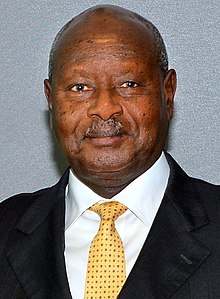Yoweri Museveni | |
|---|---|
 Museveni in 2015 | |
| 9th President of Uganda | |
| Assumed office 29 January 1986 Acting: 26–29 January 1986 | |
| Prime Minister | |
| Vice President | Samson Kisekka Specioza Kazibwe Gilbert Bukenya Edward Ssekandi Jessica Alupo |
| Preceded by | Tito Okello |
| Secretary General of the Non-Aligned Movement | |
| Assumed office 16 January 2024 | |
| Preceded by | Ilham Aliyev |
| Personal details | |
| Born | Yoweri Kaguta Museveni Tibuhaburwa 15 September 1944 Ntungamo, Protectorate of Uganda |
| Political party | National Resistance Movement |
| Other political affiliations | Uganda Patriotic Movement |
| Spouse | |
| Children | 4, including Muhoozi |
| Parent | Amos Kaguta (father) Esteri Kokundeka Nganzi (mother) |
| Education | University of Dar es Salaam |
| Signature | |
| Website | Official website |
| Military service | |
| Allegiance | |
| Branch/service | Front for National Salvation Popular Resistance Army National Resistance Army |
| Years of service | 1971–1986 |
| Rank | General |
| Battles/wars | 1972 invasion of Uganda Uganda–Tanzania War Ugandan Bush War |
Yoweri Kaguta Museveni Tibuhaburwa[a] (born 15 September 1944) is a Ugandan politician and military officer who is the ninth and current president of Uganda since 1986. As of 2024, he is the third-longest consecutively serving current non-royal national leader in the world (after Teodoro Obiang Nguema Mbasogo in Equatorial Guinea and Paul Biya in Cameroon). His government is considered autocratic.
Born in Ntungamo, Museveni studied political science from the University of Dar es Salaam where he initiated the University Students' African Revolutionary Front. In 1972, he participated in the abortive invasion of Uganda against the regime of President Idi Amin. The next year, Museveni established the Front for National Salvation and fought alongside Tanzanian forces in the Tanzania–Uganda War, which overthrew Amin. Museveni contested the subsequent 1980 general election on the platform of Uganda Patriotic Movement, though claimed electoral fraud after losing to the unpopular Milton Obote. Museveni unified the opposition under the National Resistance Movement and started the Ugandan Bush War. In January 1986, after the decisive Battle of Kampala, Museveni was sworn as president.
As president, Museveni suppressed the Ugandan insurgency and oversaw involvement in the Rwandan Civil War and the First Congo War. He ordered an intervention against the Lord's Resistance Army in an effort to halt their insurgency. His rule has been described by scholars as competitive authoritarianism, or illiberal democracy. The press has been under the authority of government. His presidency has been characterized by an upsurge in anti-gay legislation and activity and numerous constitutional amendments like the scrapping of presidential term and age limits in 2005 and 2017, respectively.
On 16 January 2021, Museveni was reelected to a sixth term with 58.6% of the vote, despite many videos and reports showing ballot box stuffing, over 400 polling stations with 100% voter turnout and human rights violations. As of 2022[update], after 36 years of his authoritarian rule, Uganda has been ranked 166th in GDP (nominal) per capita and 167th by Human Development Index.
- ^ "How do you say YOWERI MUSEVENI?". VOA Pronunciation Guide. Archived from the original on 7 August 2023. Retrieved 7 August 2023.
- ^ "Definition of 'Museveni'". Collins Dictionary. Retrieved 7 August 2023.
Cite error: There are <ref group=lower-alpha> tags or {{efn}} templates on this page, but the references will not show without a {{reflist|group=lower-alpha}} template or {{notelist}} template (see the help page).